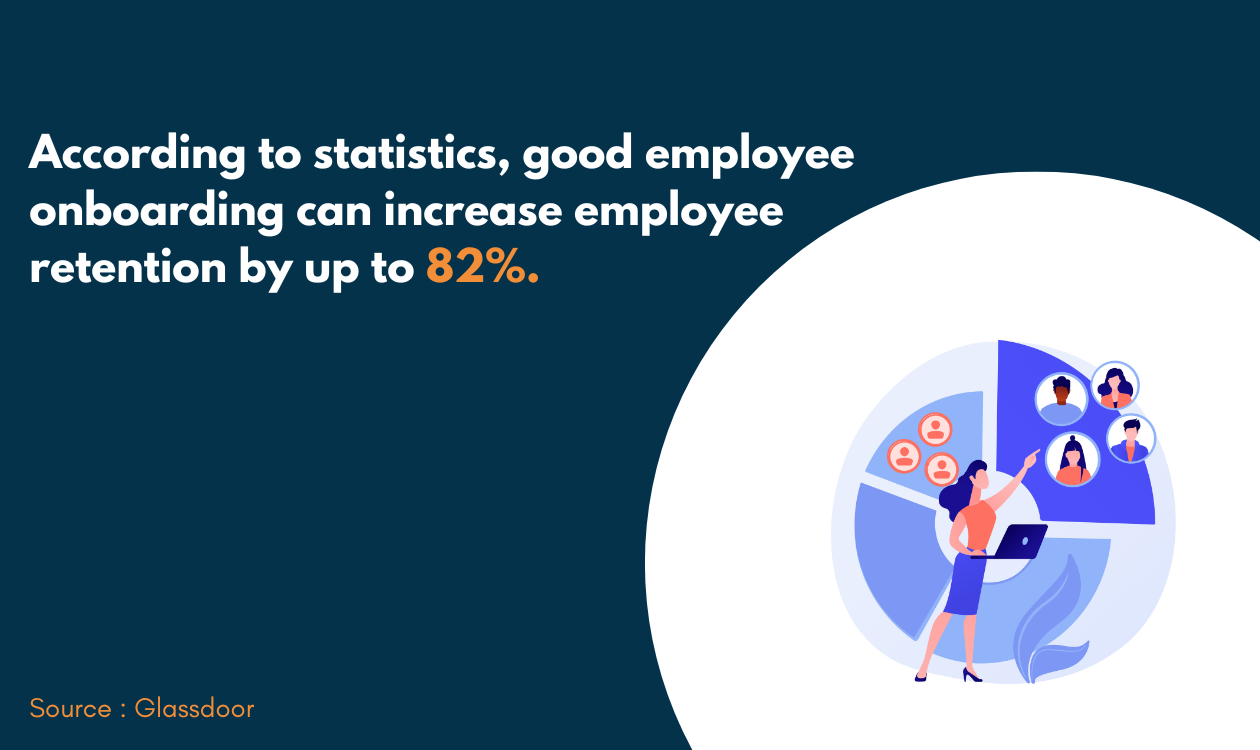10 Best Recruiting Software for Successful 2024
In today's fast-paced and highly competitive job market, recruitment professionals struggle to find the right talent to fill the o...
New employees face numerous challenges in becoming ready for work. They must learn a new workflow, understand their new role, adjust to their unique working environment, and form relationships with their colleagues. This is all happening at once, which can be overwhelming for them. As a result, businesses develop an onboarding strategy, either in-person or digital onboarding journeys, to assist new employees in adjusting to their new environment.
Onboarding new employees are one of the most important aspects of a well-run business. It is an important activity because it determines how productive new employees will be in the future and ensures they will not stifle your company's growth.
This strategy includes the use of an onboarding portal and the presence of an onboarding manager to assist new hires in getting started when they join the company.
But how do these elements contribute to the onboarding process? This article will go over the onboarding portal and onboarding manager, as well as why you need them.
An onboarding portal is a central site/digital location where new staff members can access important information, manage tasks, communicate, collaborate with their team, and get up to speed as quickly as possible. The more information a new hire has at their disposal, the easier and faster they will be able to achieve maximum productivity. In addition, because new employees tend to be hesitant to ask questions, the portal should be friendly and straightforward.
Your onboarding portal must:
Have a structured system for delivering information
Connect the new hires with your team and makes them feel part of the family
Integrate well with your current workflow and systems
Create an enjoyable experience for the new hire
Have pre-boarding capability
An onboarding manager oversees new employees' smooth onboarding, including pre-onboarding and onboarding processes. An onboarding manager's job description can be pretty broad, encompassing tasks such as creating company documents, filing paperwork, welcoming new hires, introducing them to other team members, and scheduling tasks/ meetings/training sessions.
If hiring many employees is an essential part of your business, you should consider having an onboarding manager and dedicated onboarding software. Having the right people and resources at your disposal is the best way to work more efficiently and effectively.
According to statistics, good employee onboarding can increase employee retention by up to 82%.

According to statistics, 34% of new hires left a job within the first 90 days because of an incident or bad experience, including having an ineffective onboarding journey. This is why an excellent onboarding system and its process are essential for getting your employees up to speed, settled in, and fully integrated into your team. It is costly to replace staff members because new employees may incur additional training costs, lost productivity time, and added offboarding costs when employees leave the organisation.
Simply put, you want your new team members to be productive as soon as possible. The faster new hires can get up to speed, the sooner they can be fully effective. If you hire a new employee every two months and it takes them three months to become fully productive, you have wasted a lot of time. Implementing efficient and effective onboarding procedures through an onboarding portal can significantly reduce this ineffectiveness.
Onboarding can go a long way toward making new employees feel like they are a part of the company and are aligned with the vision, mission, values, and company culture. Onboarding can be a powerful platform for integrating employees into your way of doing things and making them feel at ease. Making employees feel that they belong to the team and are valued is critical. They will then give their all to the organisation, and both parties will be satisfied.

1. Provides an easy and smooth transition for your new hire.
An onboarding portal will make your new hires feel welcome and at ease as they learn the company's procedures and policies. It will also help make the transition into a new work environment seamless.
2. It can be customised to suit your business.
Your onboarding portal can be tweaked and customised to meet your business's needs. As your company's needs change and evolve, so should your onboarding portal. This way, you can ensure that your portal remains fresh and engaging even as your business grows.
3. Ensures maximum productivity as soon as possible.
You can use an onboarding portal to schedule tasks, track progress, enable chat functionality, present important information, and set reminders. Your new hire can settle in quickly and become productive in their workflow with as little downtime as possible. Consequently, you'll have less time and money wasted for the company and more profit.
1. You will save money.
Staff turnover costs are high, so hiring the right people will save you money. An onboarding manager increases your chances of getting your hiring and onboarding processes right on the first try. Doing a dedicated resource correctly will save money on unnecessary staff turnover.
2. Your team will work productively.
No new employee will be fully productive from the start; however, the goal should always be to get them there as soon as possible. Having an onboarding manager to coordinate the onboarding process will allow your recruits to be up to speed as quickly as possible. Furthermore, if there is an onboarding manager to drive the onboarding process, your current team doesn't need to be fully involved in creating the onboarding journey. You can set it up, so they only need to participate in the team introduction section or be engaged by being the new talent's mentor.
3. Your staff will be happier.
Having an onboarding manager drives the onboarding process. It ensures a pleasant experience for your new hire and guarantees that the burden does not fall on other staff members, resulting in a happy and productive team. Many businesses burden their employees–especially the HR team–with onboarding preparation and implementation. By having an onboarding manager, they will take on this responsibility and work to make the onboarding process enjoyable for all parties.
In conclusion, an onboarding portal is an efficient way to present the necessary information, tools, and assistance to your new hire. The main goals are for them to settle in and reach maximum productivity as soon as possible. At the same time, an onboarding manager is vital to a smooth onboarding process, as they can ensure the new hire feels welcome.
Now that we have established why an onboarding portal and onboarding manager are so important, the following questions arise: how can you choose the right onboarding portal and hire the right onboarding manager?

1. Ensure the software offers the functionality you require.
Think about the features, the information you need to present, and the pre-onboarding functionality. Will the software meet your business requirements and provide robust features?
2. Ensure it integrates with your existing tools, software, and workflow.
Make sure that the software seamlessly integrates with your current workflow, making your life easier, rather than requiring you to change your workflow and adapt to the new tool drastically.
3. Ensure the user experience is pleasant.
You want the onboarding experience for new team members to be as pleasant as possible, so you need user-friendly, enjoyable software. If possible, try a software demo and get a feel for it before purchasing it.
1. Take your time.
Hiring a new staff member always requires adequate due diligence, but even more so when hiring someone into a vital role, such as an onboarding manager. Take your time and do not rush. If you bide your time and look for the right person, you will find them.
2. Make sure your onboarding manager is passionate about the job.
Find someone who enjoys and is enthusiastic about their job. Working with new employees can be difficult, so having someone passionate about their work could make them feel less stressed in doing their job.
3. Ascertain their character and personality traits.
We recommend that the onboarding manager should have the most, if not all, of the following characteristics:
1. Excellent written and verbal communication abilities for creating onboarding templates
2. Previous HR experience
3. Meticulous planning abilities
4. Proven track record of cross-departmental teamwork
5. Empathetic and patient
Keep these in mind as you go through the hiring process, and make sure you run enough tests and evaluations to find someone who matches what you are looking for.
You only get one chance to make a first impression, and the first impression usually sticks.
Onboarding is a company's first impression of new employees. Therefore, it is critical to maintain a healthy business and work environment and ensure your team is motivated, productive, and efficient. An onboarding portal and an onboarding manager are two critical parts of the onboarding process that can save you a lot of money and time in the long run. Therefore, consider having both. They are a well-worth investment.
Demos are a great, fast way to learn about iSmartRecruit.
Connect with us now to learn more!
